A futuristic extravagance for a practical reality in your own backyard? The answer might just surprise you. From saving energy and dollars to improving security and daily ease, smart homes are quickly becoming one of the smartest investments in modern life. If you are a technology enthusiast or starting your journey towards intelligent living, this blog will walk you through all that you need to know about what is a smart home, especially in the UK.
Definition of Smart Home
What is a smart home? A smart home is a house that has a fitted a set of devices, systems, and appliances that can be controlled remotely and typically on their own. The devices communicate with one another via the internet, hence the term Internet of Things (IoT), in a way that the homeowner can relax and control all from lighting and warmth to protection and enjoyment.
Key Features of a Smart Home
In contrast to traditional systems, smart homes offer zone-based control, especially with big houses. Beyond basic options, smart homes allow multi-step, condition-dependent routines or “scenes” that respond to something besides time or one input.
For example, a “Good Morning” scene may include opening blinds, coffee brewing, heating adjustments, and news, all triggered by your phone alarm or sunrise. These are the sophisticated features that power the next generation of smart living:
- Interconnectivity
- Remote access
- Automation
- Voice control
- Real-time monitoring
- Personalization
- Energy optimization
- Integration with Wearables
- Learning and adaptation
- Enhanced security systems
- Sensor-Based Intelligence
- Motion sensors to sense presence
- Temperature and humidity sensors for climate control
- Conditional triggers for time, presence, or weather

How Smart Homes Work?
After getting to know what is a smart home? It is time to know how smart homes work? These homes use interconnected systems and intelligent communication to operate different tasks in your everyday life.
Smart home is a bunch of smart devices which are connected to each other and receive their commands easily. These homes mostly work with smart devices, sensors and controllers.
Benefits of Smart Home
Smart homes provide numerous advantages that turn daily tasks into easy experiences. Smart home appeal is far more than flashy gadgets or space-age pizzazz. Let’s discuss the top benefits in greater detail. The benefits come in several categories as below.
Convenience and Control
Smart living revolves around authentic, life-enhancing benefits that enable us to be more effective in our connections with our worlds, our homes, then, are not only smarter but also cozier, safer, more effective, and accessible.
Smart homes allow you to control it all from one place, a smartphone app or voice assistant.
Energy Efficiency and Savings
Smart Thermostats is Smart Climate Control. Smart Lighting means Lighting Without Waste. Generally, you can schedule or automate power shutdowns, track power consumption by device and switch off unused appliances remotely.
Real-Time Energy Monitoring shows the energy efficiency and savings option. Some of the smart systems give you detailed reports and real-time energy monitoring of how much energy you are using.
This gives you explicit knowledge of where your energy is going and where you can save even further. Some apps even give you cost-saving tips based on your data.
Enhanced Security and Safety
Some models even lock up when you leave the house. doorbell camera is useful option in a smart home. You can see and converse with folks at your door in real time, even if you’re not nearby.
Motion-record devices save recordings and alert you to strange activity. Surveillance Cameras provide different security options. Moreover, indoor and outdoor intelligent cameras give HD streaming video, night vision, motion detection, and cloud storage. Others use AI to recognize known faces or spot suspicious activity.
Increased Home Value
Smart technology houses are considered futuristic and modern. Smart technologies, especially security devices and energy-efficient devices, are very much sought after by homeowners in the UK.
The addition of smart technology can increase resale value and salability in a competitive housing market.
Accessibility for Everyone
Easy Home Access is one of the benefits of a smart home. Smart door locks and smart doorbells aid in easy sight of guests for an individual in a bed, wheelchair, or on assistive equipment and granting access without needing to shift.
what are the best smart locks compatible with voice assistants?How Does a Smart Home Improve Your Lifestyle?
We have explained what is a smart home and how it works. It is ideal to know its process for improving your lifestyle. Let’s check out how it improves your way of life through 3 key functions in the following.
Simplifying Every Tasks
From having chores completed to organizing all the family activities in sync, a smart home works like your silent assistant, doing the little things so you can focus on your own priorities.
- Lights can be switched off when you leave the room.
- The heating system can detect when to warm your home.
- Smart homes also enable multi-tasking at a new level.
Voice Assistant and Automation
Your Home is a Personal Assistant. It’s not just smart, it’s smart-memoried. You can establish smart routines that initiate several actions from a single occurrence or voice command.
This profound option of voice interaction and automation doesn’t make things simpler; it elevates your daily life. It eliminates tedious options, anticipates your needs in advance, and regains command of your environment in the most natural, human way possible.
With the power of words, or not at all, your smart home is a living, learning helper designed to act on your behalf on a daily basis.
Remote Access to Your Home
Perhaps the greatest freedom that smart homes offer is access from afar. That sort of control ensures you and simplifies life more than ever before. Generally, remote access makes your smart home your faithful friend and guardian, whether present or absent.

Smart Home Devices You Can Integrate
All smart home products and devices can work independently, but the sorcery is when they’re combined in a central system. We will explain more about these devices.
Smart Lighting
Smart lighting is the easiest and simplest item available in a smart home. You can control your house’s lightning remotely and easily.
Smart Thermostats
Some even provide you with data on your use of energy and provide efficiency tips. For whoever lives in a region of extremely hot temperatures, a smart thermostat is no longer something of luxury, but a comfort, a means of control, and savings.
Smart Security Systems
The integration of smart security devices adds a further layer of notice and response to your home.
Smart Appliances
Smart appliances provide an easy and ideal lifestyle for users. Different appliances can control your smart devices like fridge and oven.
Smart Entertainment Systems
With intelligent entertainment, it all integrates. You can listen to music, watch TV etc. via smart entertainment systems.
How to Set up Smart Home System?Getting Started with a Smart Home in the UK
It’s never been simpler to start your smart home journey in the UK, with a growing market of interoperable products, supportive energy providers, and improved broadband reach.
Choosing the Right Smart Home Devices for Your Home
Do you want to make your home more secure or render your area more comfortable? In this case, you have to choose the right smart home devices for your house.
Setting Up Your Smart Home System
Installation of a smart home system need not be professional unless built-in hardware like thermostats or smart switches are being used. Ensure that you group your devices into rooms or groups in your app so automation and voice control are simple.
An example is that the instruction “Turn off the kitchen lights” will only be successful if your smart bulbs are well labeled and grouped. Most apps also allow you to assign users, monitor activity, and personalize settings remotely.
This initial setup will have your smart home working as intelligent, rather than simply connected.
Connecting Your Devices for Seamless Automation
Most modern ecosystems also support conditional automation, actions being initiated by time of day, location (your phone’s GPS), motion detectors, or weather data.
Through thoughtful configuration, automation makes your home into space that actually plans ahead. For example, your “Leaving Home” routine can switch off lights, reduce heating, and activate security systems in unison.

The Future of Smart Homes in the UK
The UK smart home sector is growing aggressively with more and more households embracing connected living year on year. Enhanced broadband speeds, fuel price inflation, and a national interest in sustainability will drive stupendous growth in smart home adoption over the next few years.
Government incentives through the mass deployment of smart meters and energy conservation programmes are also encouraging UK residents to invest in smarter, more sustainable homes.
In the short term, smart homes will no longer be a luxury product, they’ll be business as usual in new builds and retrofits of existing ones.
Upcoming Smart Home Technologies
There is also a surge in energy-intelligent homes, where solar panels, home batteries, and smart EV charging are managed by an intelligent system to reduce cost and emissions.
These advancements will construct houses not only connected but truly intelligent, responsive, and green.
How Smart Homes Will Evolve in the Next Decade
Smart homes within the next 10 years will move away from being a group of intelligent devices to essentially integrated, context-sensing surroundings. The homes will learn not only what you do, but why you’re doing it, proactively anticipating your habits, emotions, and shifts in lifestyle.
For example, your home could recognize tension through voice tone and lighting selections, then subtly change ambiance and temperature to calm you down without you ever having to say a word.
We will also notice a great emphasis on interoperability, privacy, and decentralization. Instead of moving data to the cloud, intelligent homes will do more processing locally, saving user privacy and making them more reliable.
Intelligent districts could potentially be developed, where homes exchange energy supplies and safety networks. Smart homes will be a central element in climate goals, elderly population requirements, and national targets for energy efficiency for the UK specifically, making them an important aspect of the nation’s future infrastructure.

Conclusion
Smart home evolution in the UK is not a trend, it’s a revolution. Now, UK citizens have the ability to construct homes that are not just efficient, but also intelligent, homes that calculate, learn, and protect. And the best part? You don’t have to be a tech wizard to get on the bandwagon.
Why Invest in a Smart Home in the UK?
Purchasing a smart home in the UK is a sensible and sensical choice. Also, there are plenty of incentives and possibilities in the UK market, like smart meter schemes and eco-home grants to facilitate smarter living.
Either you’re restoring your home or doing it room by room, adopting smart technology increases your property value and aligns you with modern sustainable living standards.
The Future is Smart: Benefits to Look Forward To
If you are now ready to start or expand your smart home system, Simpled offers exactly what British homeowners these days need: reliable, intuitive, and beautifully crafted smart home devices specifically for real life.
From premium digital door lock to video intercom systems, Simpled offers best-in-class solutions that not only secure and automate homes but also in great style. What distinguishes Simpled is our emphasis on simplicity, security, and seamless integration.
Our UK door-compatible smart door locks, for example, enable you to control who comes into your home through app, fingerprint, or keypad, in maximum security with none of the compromise on convenience.
Frequently Asked Questions
What is a smart home in 2025?
A smart home in 2025 uses devices like smart locks, lights, and Alexa to automate tasks, enhance security, and improve convenience in UK homes.
How do smart locks fit into a smart home?
Smart locks, like Yale or Simpled, integrate with smart home systems via Alexa or Matter, offering voice control and remote access for UK users.
What are the benefits of a smart home in 2025?
A 2025 smart home provides security (e.g., smart locks), energy savings, and automation, making UK living safer and more efficient.



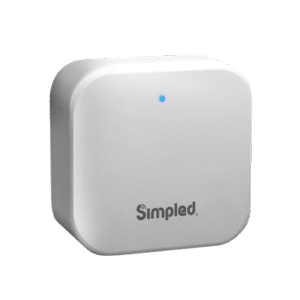
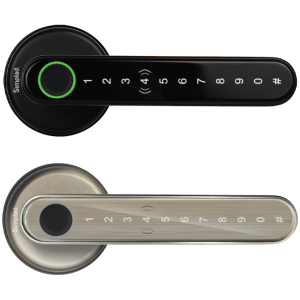
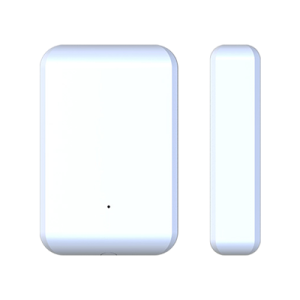
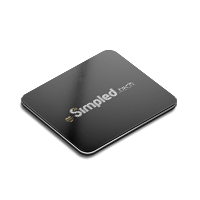
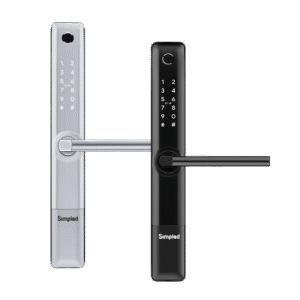
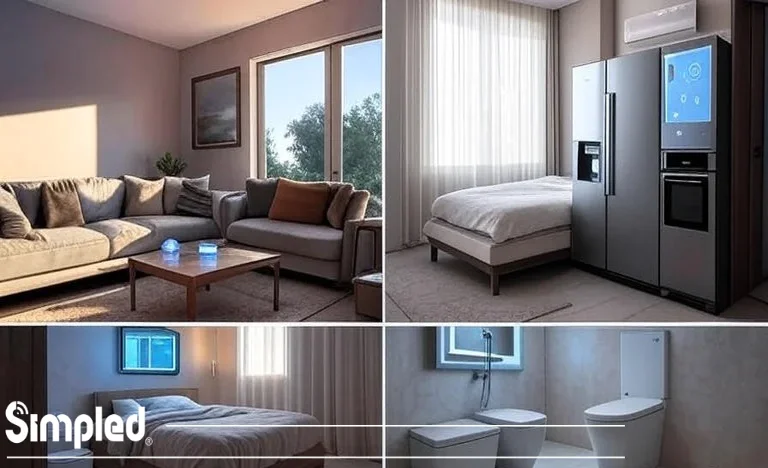






Leave a Reply